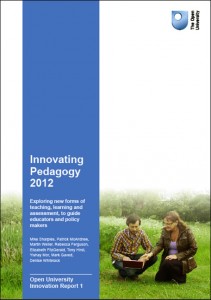Innovatig Pedagogy 2012. Informe The Open University vía @MoodleMcKean
Gracias a nuestra navegación diaria por er twitterío ... y en el timeline dePaul McKean, al que os aconsejamos seguir @MoodleMcKean
MSc student. Interested in pedagogy, mobile & elearning, Moodle,
PLEs, iPad & the impacts they have. Views are mine.
 Hoy traemos a este espacio el informe de The Open University titulado "Innovatig Pedagogy 2012" .. que nos presentan así
Hoy traemos a este espacio el informe de The Open University titulado "Innovatig Pedagogy 2012" .. que nos presentan así
The series of reports explores new forms of teaching,
learning and assessment for an interactive world, to guide teachers and
policy makers in productive innovation.
The first report
proposes ten innovations that are already in currency but have not yet
had a profound influence on education. You can see a summary of each
innovation at the menu on the right. Please contribute with comments on
the report and the innovations.
Su nota de prensa la teneis aquí:
UK universities are missing opportunities to innovate in teaching according to a report published (23 July 2012) by The Open University.
Innovating Pedagogy 2012 highlights ten new methods of teaching, learning and assessment that universities could adopt, including social learning with e-books, seamless learning and personal inquiry learning.
Mike Sharples, Professor of Educational Technology and lead author of the report, said: “UK universities are facing competition from companies and overseas colleges that offer short courses using innovative teaching methods like MOOCs (Massive Open Online Courses). These are courses without boundaries that are attracting hundreds of thousands of students worldwide who watch live teaching from star professors and then share and discuss the ideas online.”
Opportunities that should be exploited more include using online assessment to support learning by giving students automatic feedback on their progress, and for universities to work with companies in developing a new generation of e-books for learning, with facilities for students to watch multimedia presentations and simulations embedded in the text and to work in groups sharing notes between connected online books.
The report also identifies innovations developed in other areas, such as computer games that could be adopted for university teaching. Badges, like computer versions of scout and guide badges, can provide a way to reward students who successfully gained a skill or provide useful help to their colleagues. Smartphones could also be used as scientific tools to carry out large scale science projects, such as measuring noise pollution or recording wildlife.
The report also points to some areas where the UK is leading the way with new developments in teaching and learning. iSpot, developed by The Open University, has engaged many thousands of students and members of the public in forming an online scientific community to share their observations of wildlife, supported by expert mentors. The Open University is also developing multimedia e-books and using new methods of learning analytics to track how its 195,000 students study online, providing them with more immediate and personal advice.
The Innovating Pedagogy 2012 report was published by The Open University on 23 July 2012
(...)
The report has been written by a small group of academics in the
Institute of Educational Technology and the Faculty of Mathematics,
Computing and Technology at The Open University.
The authors are:
Mike Sharples, Patrick McAndrew, Martin Weller, Rebecca Ferguson,
Elizabeth FitzGerald, Tony Hirst, Yishay Mor, Mark Gaved, Denise
Whitelock
Fuente: [open university ]
- Bitácora de eraser
- Log in or register to post comments



